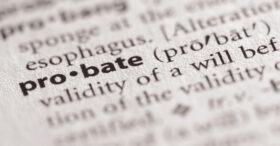Although probate can be time consuming and expensive, one of its biggest downsides is that it’s public — anyone who’s interested can find out what assets you owned and how they’re being distributed after your death. The public nature of probate may also draw unwanted attention from disgruntled family members who may challenge the disposition of your assets, as well as from other unscrupulous parties.
The good news is that by implementing the right estate planning strategies, you can keep much or even all of your estate out of probate.
Probate, defined
Probate is a legal procedure in which a court establishes the validity of your will, determines the value of your estate, resolves creditors’ claims, provides for the payment of taxes and other debts, and transfers assets to your heirs.
Is probate ever desirable? Sometimes. Under certain circumstances, you might feel more comfortable having a court resolve issues involving your heirs and creditors. Another possible advantage is that probate places strict time limits on creditor claims and settles claims quickly.
Choose the right strategies
There are several tools you can use to avoid (or minimize) probate. (You’ll still need a will — and probate — to deal with guardianship of minor children, disposition of personal property and certain other matters.)
The simplest ways to avoid probate involve designating beneficiaries or titling assets in a manner that allows them to be transferred directly to your beneficiaries outside your will. So, for example, be sure that you have appropriate, valid beneficiary designations for assets such as life insurance policies, annuities and retirement plans.
For assets such as bank and brokerage accounts, look into the availability of “payable on death” (POD) or “transfer on death” (TOD) designations, which allow these assets to avoid probate and pass directly to your designated beneficiaries. However, keep in mind that while the POD or TOD designation is permitted in most states, not all financial institutions and firms make this option available.
For homes or other real estate — as well as bank and brokerage accounts and other assets — some people avoid probate by holding title with a spouse or child as “joint tenants with rights of survivorship” or as “tenants by the entirety.” But this has three significant drawbacks: 1) Once you retitle property, you can’t change your mind, 2) holding title jointly gives the joint owner some control over the asset and exposes it to his or her creditors, and 3) there may be undesirable tax consequences.
A handful of states permit TOD deeds, which allow you to designate a beneficiary who’ll succeed to ownership of real estate after you die. TOD deeds allow you to avoid probate without making an irrevocable gift or exposing the property to your beneficiary’s creditors.
Discuss your options
Because of probate’s public nature, avoiding the process to the extent possible is a goal of many estate plans. Implementing the proper strategies in your plan can protect your privacy and save your family time and money. Contact us with questions or to discuss your options.
© 2021 Covenant CPA

